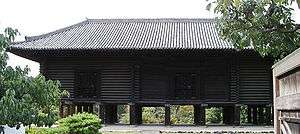Enpō
| History of Japan |
|---|
 |
Enpō (延宝), also Empo, was a Japanese era name (年号, nengō,, lit. "year name") after Kanbun and before Tenna. This period spanned the years from September 1673 to September 1681.[1] The reigning emperor was Reigen-tennō (霊元天皇).[2]
Change of era
- 1673 Enpō gannen (延宝元年): The new era of Enpō (meaning "Prolonged Wealth") was created to mark a number of disasters including a great fire in Kyōto. The previous era ended and a new one commenced in Kanbun 14, on the ninth day of the 13th month.
Events of the Enpō era
- 1673 (Enpō 1): There was a great fire in Heian-kyō.[3]
- 1673 (Enpō 1): The foundations for Mitsui financial success began with the opening of a dry good store in Edo.[4]
- May 10, 1674 (Enpō 2, 5th day of the 4th month): Ingen Ryuki, founder of the Ōbaku sect of Japanese Zen Buddhism, died at Mampuku-ji, a Buddhist temple which Ingen had founded at Uji, near Heian-kyō.[3]
- 1675 (Enpō 3): A devastating fire burned Heian-kyō.[3]
- 1675 (Enpō 3): The Bonin Islands (Ogasawara Islands) are explored by shogunate expedition, following up "discovery" of the islands by the Japanese when a ship bound for Edo from Kyūshū is blown off course by a storm in Kanbun 10. The islands are claimed as a territory of Japan.[5]
- April 7, 1680 (Enpō 8, 8th day of the 3rd month) : Tokugawa Ietsuna, the 4th shogun of the Edo bakufu died; and his named successor, Tokugawa Tsunayoshi, was ready to take his place as the 5th Tokugawa shogun.[3]
Notes
- ↑ Nussbaum, Louis-Frédéric et al. (2005). "Empo" in Japan encyclopedia, p. 176., p. 176., at Google Books
- ↑ Titsingh, Isaac. (1834). Annales des empereurs du japon, pp. 414-415.
- 1 2 3 4 Titsingh, p. 414.
- ↑ Hall, John Whitney. (1970). Japan: From Prehistory to Modern Times, p. 209.
- ↑ Tanaka, Hiroyuki. (1993). "The Ogasawara Islands in Tokugawa Japan", Kaiji Shi Kenkyuu (Journal of the Maritime History).
References
- Hall, John Whitney. (1970). Japan: From Prehistory to Modern Times in Delacorte World History, Vol. XX. New York: Delacorte Press. ISBN 0-297-00237-6
- Nussbaum, Louis-Frédéric and Käthe Roth. (2005). Japan encyclopedia. Cambridge: Harvard University Press. ISBN 978-0-674-01753-5; OCLC 58053128
- Screech, Timon. (2006). Secret Memoirs of the Shoguns: Isaac Titsingh and Japan, 1779-1822. London: RoutledgeCurzon. ISBN 978-0-203-09985-8; OCLC 65177072
- Tanaka, Hiroyuki. (1993). "The Ogasawara Islands in Tokugawa Japan", Kaiji Shi Kenkyuu (Journal of the Maritime History). No. 50, June, 1993, Tokyo: The Japan Society of the History of Maritime.... Click link to digitized, full-text copy of this monograph (in English)
- Titsingh, Isaac. (1834). Nihon Odai Ichiran; ou, Annales des empereurs du Japon. Paris: Royal Asiatic Society, Oriental Translation Fund of Great Britain and Ireland. OCLC 5850691.
External links
- National Diet Library, "The Japanese Calendar" -- historical overview plus illustrative images from library's collection
| Preceded by Kanbun |
Era or nengō Enpō 1673–1681 |
Succeeded by Tenna |
This article is issued from Wikipedia - version of the 10/1/2016. The text is available under the Creative Commons Attribution/Share Alike but additional terms may apply for the media files.